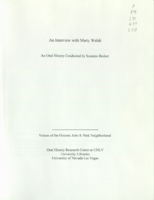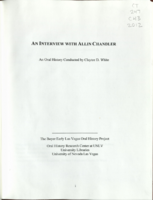Search the Special Collections and Archives Portal
Search Results

Transcript of interview with Ruth Hazard by John Neal, March 8, 1975
Date
Archival Collection
Description
On March 8, 1975, John Neal interviews Ruth Hazard (birthdate unknown, 67 years old) in her home about her memory of how Southern Nevada has changed economically. Hazard goes in-depth about her knowledge of municipal politics and her husband’s friendships with a number of Nevadan politicians. Hazard also briefly talks about her fascination with the above-ground atomic tests, speakeasies during Prohibition, and local anxieties about Las Vegas “losing its identity.”
Text

Transcript of interview with Lomie Heard by Stephen Singer, February 9, 1980
Date
Archival Collection
Description
On February 9, 1980, collector Stephen M. Singer interviewed schoolteacher, Lomie Heard (born January 22nd, 1906 in Carlsbad, New Mexico) in her home in Las Vegas, Nevada. This interview covers education over the span of thirty years, and includes an overview on the building of the University of Nevada Las Vegas. Also discussed during this interview: Nellis Air Force Base, jet airplanes at Nellis, military families, and the Nevada Test Site.
Text

Transcript of interview with Emma Ellsworth by Clark Ellsworth, March 5, 1980
Date
Archival Collection
Description
On March 5, 1980, Clark Ellsworth interviewed his grandmother, Emma Ellsworth (born 1902 in Payson, Utah) about her experiences in Southern Nevada. Ellsworth first talks about growing up in Utah and getting married before moving to Pioche, Nevada during the Great Depression. She also talks about bringing up a family in Las Vegas as well as her and her husband’s work in running Beneficial Life, a life insurance business, in Las Vegas. Ellsworth also talks about the Mormon churches in Las Vegas, the schools her children attended, and the number of grandchildren and great-grandchildren she had at the time.
Text

Transcript of interview with Murl Emery by James M. Greene, October 18, 1974
Date
Archival Collection
Description
On October 18, 1974, James M. Greene interviewed Murl Emery (born June 7th, 1903 in Bolton, California) at his home in Nelson, Nevada. Also present during the interview is Mrs. Emery and Mr. Dutch Eckhart, a guest who has just arrived to visit with Mr. Emery. The interview covers Mr. Emery’s personal experience in and around Southern Nevada, particularly in the areas from Searchlight, Nevada to Nelson, to Boulder Canyon, but mostly on the Colorado River. Mr. Eckhart also helps to interject some insight into the popularity of the Model T Ford in those days and early days of newly paved roads. Additionally, they discuss water shortage, wells, the building of the railroad, and mining in Nevada. Mr. Emery also discusses the books that were written about his adventurous life, his discoveries and his explorations.
Text

Transcript of interview with Marty Walsh by Suzanne Becker, July 19, 2007
Date
Archival Collection
Description
In 2002, Marty Walsh and her husband purchased a home in the John S. Park Neighborhood. Three aspects attracted them to their 1941-built home: the quality construction; the aesthetics and details of the house; and the "old-fashion human element" that she associated with her grandparents. Marty describes their relocation to Las Vegas after living for nine years in Ireland and her joy of discovering the John S. Park community. For her there is a neighborliness that they found in the form of the Neighborhood Watch. She feels the neighborhood still has work to do, but the gentrification has had splendid results as new "urbanites" replace original homeowners. From her artist point of view, she also provides thoughts about the impact the artist community of musicians, painters, and creative artists has had on the neighborhood. Even though she is relatively new to Las Vegas, she is well researched in the historic aspects of John S. Park location: once a fertile plot of land where
Text

Transcript of interview with Allin Chandler by Claytee White, February 5, 2013
Date
Archival Collection
Description
Another member of Rancho High School's first graduating class of 1962, Allin Chandler charted a course that took him from school football to a distinguished career as a teacher, principal, and Executive Director for the Clark County Association of School Administrators. Allin moved to Las Vegas from Texarkana, Texas with his mother in 1958, joining his father who was serving in the Air Force and stationed at Nellis AFB. Starting 9th grade at J.D. Smith Junior High and continuing on to Rancho the following year. Still actively involved in school athletics, Allin quickly discovered his talent and love for maths and science and eventually earned his degree in math and education. The stories Allin shares in this interview paint a vivid picture of how an intelligent and motivated young man can succeed - and how the class-free world of Las Vegas in the 1950s and 60s offered opportunities that he would never have had in class-conscious world of the South.
Text

Gene Leavitt interview, February 28, 1979: transcript
Date
Archival Collection
Description
On February 28, 1979, collector Monte Leavitt interviewed Gene Leavitt (born October 6th, 1923 in Mesquite, Nevada) at his home in North Las Vegas, Nevada. In this interview, Mr. Leavitt talks about his career as a truck and bus driver. He also talks about the life in Southern Nevada, the soldiers stationed here, and gambling.
Text

Relda W. Leavitt interview, March 18, 1976: transcript
Date
Archival Collection
Description
On March 18, 1976, collector David Steele Broussard interviewed Relda Whitney Leavitt (born April 3rd, 1917 in Saint Thomas, Nevada) at her home in Las Vegas, Nevada. In this interview, Mrs. Leavitt discusses growing up in Saint Thomas, Nevada before her family moved to Las Vegas. She also discusses moving to Las Vegas, Nevada and her family’s dairy business in Whitney, Nevada. She speaks about the different changes and growth she has seen in Las Vegas over the years.
Text

Jean Sherman McColl interview, March 1, 1977: transcript
Date
Description
On March 1, 1977, collector Sam C. Melchiome Jr. interviewed Jean McColl (born May 24th, 1931 in California) at her home in Las Vegas, Nevada. In this interview, Jean McColl discusses growing up in Searchlight and then Las Vegas, Nevada. She discusses how her family came here as well as the many changes she has seen through the decades living in Las Vegas, Nevada.
Text

Transcript of interview with Evelyn Miller McDonald by Maylene C. Cabatingan, February 26 & 27, 1980
Date
Archival Collection
Description
On February 26, and 27, 1980, Maylene C. Cabatingan interviewed Evelyn Miller McDonald (born 1905 in Alderson, West Virginia) about her life in Las Vegas, Nevada. Also present during the interview is Maylene’s step-father (name unknown) who occasionally participates in the conversation. At the time of the interview, McDonald had lived in Nevada for over seventy-two years and described early Las Vegas as a small-town railroad community with few amenities. McDonald discusses her occupational history, and how her father started the first car garage in Las Vegas. She goes on to talk about the impact of the Great Depression on Las Vegas and how Hoover Dam’s construction reduced the severity of the financial depression in comparison to other cities. She then recites the hotels that were built and the appeal that Vegas had to tourists and divorcees. McDonald later discusses how prostitution was accepted by the community, and recalls a story about how local businessmen rallied together to ensure that a minister would preach the funeral for a young woman who had died, despite being a prostitute. McDonald concludes her interview with a brief discussion of her goals in life and her pride in her daughters.
Text
